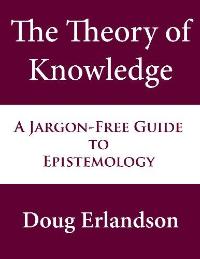In “The Theory of Knowledge: A Jargon-Free Guide to Epistemology,” Dr. Doug Erlandson provides a straightforward and easy-to-understand overview of the area of philosophy that deals with the concept of knowledge. Drawing on the thought of philosophers past and present, Erlandson discusses issues such as what knowledge is, the problem of skepticism and doubt, how we go about justifying our beliefs, the source of knowledge, the relation between consciousness and the physical world, what truth is, how we can know that other minds exist, and the relation between the mind and the brain.
Erlandson carefully but succinctly presents the various theories that philosophers have constructed in dealing with each of these issues. (For example, the chapter on the relation between the mind and the external world discusses naive and critical realism, phenomenalism, and various forms of idealism.) These theories are then examined and their strengths and weaknesses noted.
“The Theory of Knowledge” is intended as a basic introduction to epistemology and presupposes no prior familiarity with philosophical thought. It can also serve as a review for those who want to refresh their understanding of the topic. Those already familiar with the major issues in epistemology may discover some fresh perspectives on the topic.





